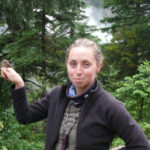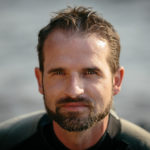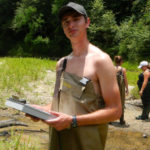EEB Seminar Series – Fall 2018
All seminars are held on Mondays at 3:30 pm in Rudder Tower 410 unless otherwise noted. Refreshments served before start.
September 3
EEB Faculty Meeting
September 6 *** Thursday *** WFES 407 *** 4 pm

“Deep Dive to Discovery”
Presenter: Carole Baldwin, Research Zoologist and VZ Dept Chair, Smithsonian Institution, Washington DC
Hosted by Kevin Conway and WFSC
September 10

“Studying the role seasonal migration plays in speciation and its genetic basis”
Presenter: Kira Delmore, Assistant Professor, Dept of Biology, Texas A&M University
Hosted by Gil Rosenthal
September 17
Postdoc Talks
“Bridging basic and applied: Saving the world with a fly”
 Jonathan Cammack
Jonathan Cammack
Decomposition ecology serves as a platform on which one can decipher the mechanisms regulating nutrient recycling of ephemeral resources. Such an approach provides opportunities for multidisciplinary studies involving fields such as entomology, microbiology, nutrition ecology, and chemical ecology. In addition to providing a greater understanding of the mechanisms that drive the natural process of decomposition, this research has application in addressing global issues of organic waste management and protein shortages. In this talk, I will present on how such basic research is being applied worldwide to help protect the environment, through mass production of the black soldier fly.
“An ecological perspective on triatomine-Trypanosoma cruzi interactions”
 Jillian Wormington
Jillian Wormington
Our colony of triatomine bugs, a resource many years in development, presents a unique opportunity to explore understudied aspects of North American triatomine biology, especially those related to transmission of Trypanosoma cruzi, causative agent of Chagas disease. We have found key differences in wing morphology between T. cruzi infected and uninfected triatomines, with implications for human and animal disease risk. Ongoing projects include comparing diel activity patterns in infected and uninfected triatomines, estimating vector competence using experimental infections with local strains of T. cruzi, and indirect xenodiagnosis using domestic dog and non-human primate blood.
Hosted by EEB
September 24

“Upstream battles: connecting species, ecosystems, and landscapes by restoring fish migrations“
Presenter: Peter McIntyre, Associate Professor, Dept of Natural Resources, Cornell University
Hosted by Kirk Winemiller
September 28 *** Friday

“Improving theory and prediction in multi-predator trophic interactions”
Presenter: Michael McCoy, Assistant Professor, Dept of Biology, East Carolina University
Hosted by Perry Barboza and WFSC
October 1

“Deconstructing an assemblage at multiple spatial and temporal scales, from contemporary metacommunities to its incipience in deep time”
Presenter: Joseph Bernardo, Research Associate Professor, Dept of Biology, Texas A&M University
Hosted by Hojun Song
October 8

“Using an historical perspective to plan for dynamic responses to environmental change”
Presenter: Jenny McGuire, Assistant Professor, School of Biological Sciences, School of Earth and Atmospheric Sciences, Georgia Institute of Technology
Hosted by Michelle Lawing
October 18 ***Thursday

“Ants, Plants, and Bacteria: Symbiosis as a Driver of Evolutionary Diversification”
Presenter: Corrie Moreau, Field Museum of Natural History, University of Chicago
Hosted by Jessica Light/EGSO and ENTO
Read more about Dr. Moreau in this National Geographic article.
October 22

“Evolution and reproductive isolation in hybrid populations”
Presenter: Molly Schumer, (Fall 2019) Assistant Professor, Dept. of Biology, Stanford University
Hosted by Gil Rosenthal and BIOL
October 30 ***Tuesday

“Loss of pollinator functional diversity reduces genetic diversity in a keystone tropical understory plant”
Presenter: Andrew Jones, Assistant Professor, Botany & Plant Pathology, Oregon State University
Hosted by Jason West
November 5

“Diversifying EEB and other STEM fields”
Presenter: Corey Welch, Director, STEM Scholars Program, Iowa State University
Hosted by Jessica Light with ABS and G2
November 12
No seminar, Entomological Society of America Conference
November 19

“Plant eavesdropping in multitrophic interactions”
Presenter: Anjel Helms, Assistant Professor, Entomology, Texas A&M University
Hosted by Hojun Song
November 26

“Evolution of social insect communication: selective pressures imposed by eavesdropping social bees”
Presenter: James Nieh, Professor, Ecology, Behavior & Evolution, UC San Diego
Hosted by Juliana Rangel
December 3
Graduate Student Talks

Luke Bower (WFSC – Winemiller Lab)
“Widespread convergence in stream fishes”
Hosted by EEB

Alexandria Payne (ENTO – Rangel Lab)
“Cross-species virus transmission in two eusocial insects: Detection of honey bee (Apis mellifera) associated viruses in ants”
Hosted by EEB